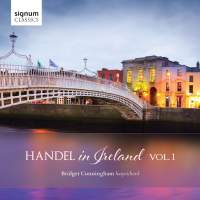Texte paru dans: / Appeared in:
Signum |
|
|
Reviewer:
Raymond Tuttle
This CD is part of an ongoing
“Handel in….” series from Signum in which Cunningham either plays the
harpsichord (or the Irish harp!) or conducts the London Early Opera group.
The contents of this particular disc, however, were released by CD Baby in
2011 with different cover art, so if you have that one already, don’t
duplicate it by mistake! If you do, then you will, as the chewing gum ad of
times gone by told you, “Double your pleasure, double your fun,” because
this is a most enjoyable release.
The premise behind it is
Handel’s arrival in Dublin in the year 1741. He stayed there for almost nine
months, making music on his own and with local or other visiting talent. The
lengthy essay in the booklet paints a picture of what life in Ireland was
like at the time (to be brief, not very good), and Handel’s activities there
included various charity concerts, including the premiere of his Messiah.
Francesco Geminiani had come and gone not long before, Thomas Roseingrave
had visited as well, and Charles Thomas Carter was born in Dublin around
1735. Legend has it that Handel’s Rinaldo was the first opera in the Italian
style to be performed in Ireland. That probably is not true, but it’s a good
enough reason to include William Babell’s unusual arrangements of two arias
from that opera in this program. Babell’s version of “Vo’ far guerra”
stretches to 13:28 in this performance, and that is because Babell included
extended florid improvisational passages similar to those that would have
been performed by singers. To my ears, anyway, they sound very strange—at
one point I was certain that my CD player was malfunctioning, but such was
not the case. I think that an entire CD of Babell’s aria
arrangements—apparently he created a good number of them—would be worth
hearing … at least once! Not everything on this CD is directly related to
Handel’s stay in Ireland, however. For example, the Harpsichord Suite No. 7
(the one that ends with the great passacaglia that many amateur pianists,
myself included, have sweated over at one time or another) was composed in
1720, long before Handel’s arrival. He might have played it in Ireland, of
course. Handel’s Forest Music probably isn’t by Handel at all! Cunningham plays two different harpsichords on this record—you’ll readily notice the differences—and an Irish Baroque harp in the second of the two Irish folk songs. (The booklet states that both are played on the harp, but that obviously is not true.) The first one has a German title because that is how Handel wrote it down in his sketches. As for Cunningham herself, no matter what instrument she plays, her performances are bright and lively, and full of creativity that, even so, never betrays the music or bursts the bounds of good taste. This is an imaginative program, imaginatively and affectionately played. I therefore look forward to Volume 2, which will be devoted to vocal and orchestral music, presumably performed by London Early Opera under Cunningham’s direction. | |
|
|
|
|
|
|
|
Cliquez l'un ou l'autre
bouton pour découvrir bien d'autres critiques de CD |
|




